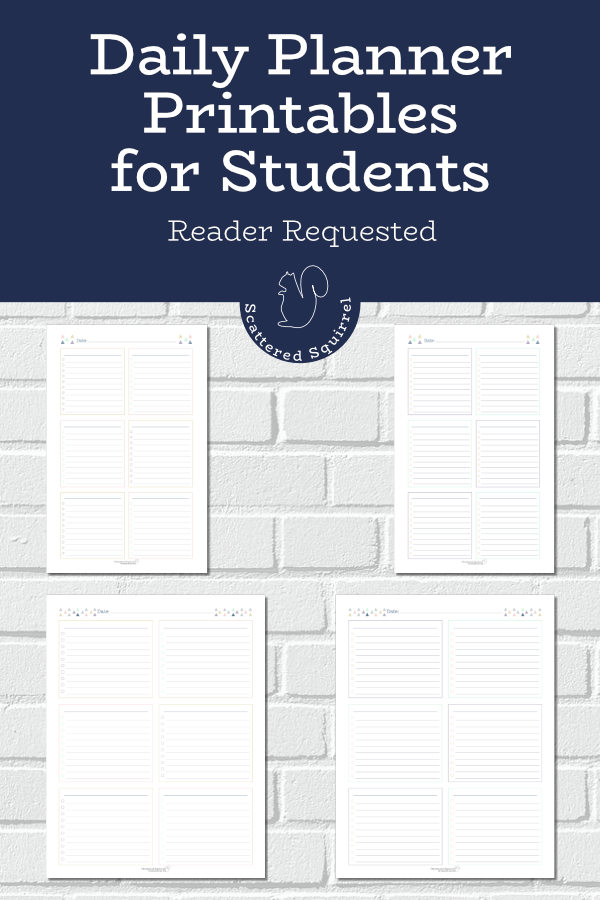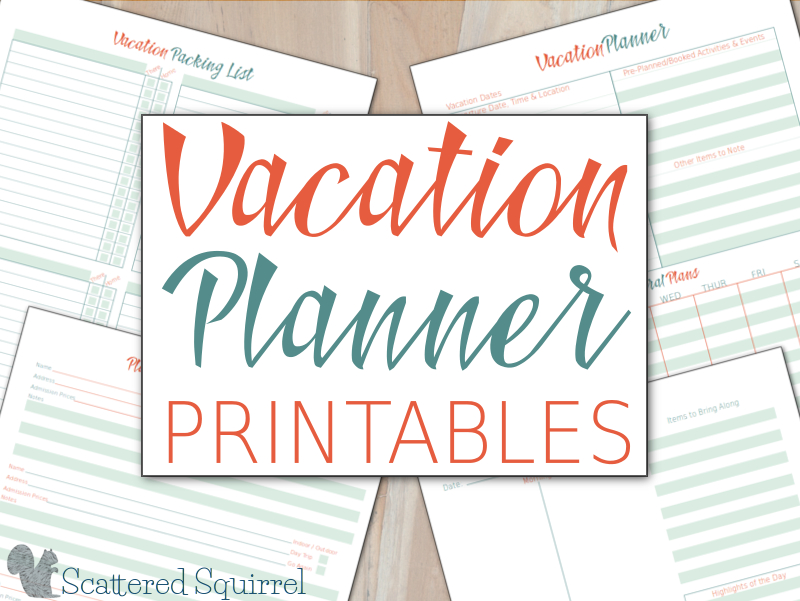Things to Consider When Planning a Move
Hello everyone, I hope you’re having an awesome week so far. We just had a long weekend here in Canada and I took advantage of having the boys home for four days to just hangout and enjoy whatever popped up. I also spent a lot of time away from the computer working on our moving plans. Last week I shared our news about the move with all of you, and I’m already in full planning mode here. Operation Moving Home isn’t moving fast enough for my eager-to-be-home little heart, but while I may not be able to do anything to speed up the time line, I can start working on our plans and figuring some things out on paper. Whenever we move, especially since we tend to only move when we’re moving out of town, there are a number of things that I feel need to be considered when planning a move. This list of mine has grown since our first move, as I learn something new with each one, but I’ve found that it’s an important step in the process that shouldn’t be skipped. Planning a move doesn’t have to take a lot of time or work, but it is something I strongly recommend spending some time with before moving day arrives.
When you’re planning a move, especially one that takes you to a new town, there’s a few things that need to be considered before you start loading that moving truck. I like to start with the big things and work my way to the little ones. As I mentioned above some of these won’t apply if you’re moving in town, but I think some will apply to any move you might be planning.
Things to Consider When Planning a Move
- location
- employment
- housing
- schools
- healthcare
- budget
- transportation of your belongings
Location! Location! Location!
Choosing a location for your move is the first step. This might also be one of those steps you don’t have a choice over. I’m sure military families can relate well to moving to a location that they didn’t choose for themselves. Whether you’re choosing the location yourself or have to move due to circumstances outside your control, there are a few things you can do to get to know the area a little bit before you arrive and hopefully help lessen the shock of living somewhere new.
- Find out what cost of living is like. There is nothing worse than moving somewhere only to find out that everything costs more there. We made this mistake once, and now it’s something I look over carefully.
- If you have a chance to visit the area before you move, take a quick stroll through the supermarket and stores you generally shop at. Check out the prices of items you normally buy, see how they compare.
- Go online and check out car and home insurance, health insurance and anything else you can think of.
- Look at the cost of real estate and rentals. Are they higher than where you live now? About the same?
- Check out the local attractions. This is a good place to start discovering your new home.
- Go online and check out the schools in the area, get an idea of what is available. I found this to be especially important for our Teen, because different schools offer different elective courses, and we wanted to make sure we were putting him in the right area for his future plans.
- Head out for dinner and find a local place to eat. Look for something small, that’s not a chain and that’s family friendly. Chance are, the staff will gladly open up and point out things you need to know about the area you’re moving into.
- Hit up the library, or head online to check it out that way. Many libraries now offer you a chance to chat with a librarian online. Ask about books or magazines of the local area. Mention you’re new to the area, or will be, and I’m sure they’ll have a ton of resources for you.
- Like wise, check out your new city or town’s website. Most have them now a days, usually full of business directories, but still it will give you an overview of what’s in your area.
- Visitor Information centers are great places to get information from too, after all, that’s their job! Though many are more geared towards tourists, they’ll still have a ton of information for you.
Employment – Someone Needs to Bring Home the Bacon
This one probably goes without saying, but I felt it was important to include none the less. When moving to a new town, lining up employment before you move is a crucial step, after all the move won’t pay for itself. Unless you’re being transferred or are really lucky and have enough in your savings account to cover your moving expenses and cost of living for a few months, you’re going to want to start looking for employment fairly soon after deciding you want to move. It can be tricky, especially when you reach the interview stage, but it’s important to start putting out those feelers fairly quickly. I’m not going to go into detail about how to job hunt, but I will leave you with a few pointers that we’ve picked up along the way:
- have a budget for travelling for interviews
- try to line up a few interviews in a row so you only have to make the trip once or twice
- mention somewhere on your cover letter and resume that you’re available for online video conferencing. Adding in your Skype address in your contacts never hurts. This tells future employers that even though you live out-of-town you’ve thought of ways to be available.
- have solid reasons for why you’re moving. Saying “we just wanted a change” doesn’t exactly sit well with possible employers. They’ll be left wondering how long you will stay for before you need another one. Even if that is your reason for moving, find more specific ways to explain it. Is this an area you always wanted to live? Do you have family close by? Are you interested in the local history? Have a friend who used to live here and loved it? Are the schools well known? Is it a better location for your other interests? (are you moving from the prairies to the mountains because you love to hike and camp?)
- keep copies of your resume and cover letter packed in a suitcase or briefcase that way you have them on you when you get there and can do some cold calling between interviews. You never know what might pop up that way.
Home Sweet Home
Figuring out your housing is a pretty important step in planning a move. The first decision to make is whether you’re going to buy or rent. Then you want to create a needs and wants list for when searching for the right home for you and your family. Things to consider are:
- what you need in a house, number of bedrooms and bathrooms etc…
- commuting time to work and/or school
- school catchment areas
- proximity to public transport (if you want/need it)
- proximity to amenities
Using the information you gathered when researching your new home town, you should be able to figure out what areas would be the best fit for you and your family. This step can take a little time, and be a little nerve-racking, especially when you’re on a deadline.
My advice, if you are buying, don’t feel pressured to buy the first place you see. When deadlines start looming it is easy to feel like you have to make a quick decision, don’t let that pressure effect your better judgement. If you haven’t found the right house to buy before the final month before you move, switch gears and start looking at rentals. It’s ok to rent for a few months, or even longer.
Renting at first when you move to a new city is a great option. It allows you to test out the neighborhood or area you think you want to live in, and if you decide it’s not the right fit – well it’s a lot easier moving house when you don’t have to worry about selling your home first.
Schools
When planning a move with children, it is always a good idea to do a little research about the schools in the area you’re moving too. Here in BC, Canada, every school district has a website with links to each school’s own webpage. A parent can spend some time surfing the sites checking out what the schools look like, where they are located, what sort of activities they do throughout the year and so on. More importantly for middle and high school students, you can download course calendars and check out what course are available at each school. While our mandatory classes are available at all schools, electives can change drastically. When our Teen started high school two years ago, he was really thankful we were in the right catchment for the school he went to. Believe it or not, it was the only highschool in our city that offered any computer courses, and at the time he was thinking he might like to go into the web or video game development industry. It’s very similar for arts students, some schools offer a more diverse selection of arts courses than others, so in many ways it pays to check into things like this ahead of time.
Even if you homeschool this step is still one you shouldn’t skip. Hop on the web and see what you can find for homeschool information in the area you’re moving too. Maybe you can find some groups or co-ops that you can check out once you get settled. It also pays to double-check the rules about homeschooling in your new area. I’m not familiar with how the rules may differ in various states, provinces and/or countries, but I know that they can/do. It’s always a good idea to double-check.
Healthcare
While it might seems silly at first, this step is just as important as the other ones. Medical coverage changes from province to province here Canada. I don’t know about what it is like in other places around the world, but knowing who to talk to, what forms to fill out, and what fees are associated with your medical coverage is pretty important stuff. Take it from someone who has done this a few times, find out if there is a shortage of doctors in the area you’re moving too, and where to put your name down on the waiting list. We’ve been here for almost three years now and I’m still waiting for a family doctor. My advice if there is a waiting list, find out if you can put your name on it before you move. That way you have a better chance of being closer to the top of the list before you get there.
Budget
It goes without saying, moving can be expensive – especially when moving out of town. Take some time before you even start packing that first box and figure out an estimate of what it will cost. You need to factor in things like:
- packing supplies
- moving truck (or moving company)
- fuel costs to get there
- meals for on the road and possibly your first night in the new place
- extra cleaning supplies – think carpet cleaning and dry cleaning drapery (if you’re renting and they happen to be dry clean only) I always plan on having to clean twice – our old home and our new home.
- deposits, transfers and/or hook up fees for your household services
- if renting your deposit plus first month’s rent (and possibly last month’s depending)
- insurance premiums for home and vehicle (they might be higher in your new home)
A few quick phone calls or some time spent online researching should give you an idea of what each of those will cost. I always like to factor in extra when I’m making up a budget. I tend to add between 30% and 50%. I know it may sound extreme but life happens, and at least you’ll have a little extra set aside in case you need it. If not, maybe you can treat yourself to something for your new home. 🙂 Having an idea of what your expenses will be is key to planning a move that is, at least money wise, stress free. It can also help you set a realistic time frame (if you have control over that) and hopefully help cut down on any nasty surprises that sometimes pop up.
Transporting Your Belongings
My last thing to consider when planning a move is how we’re transporting our belongings. We’re DIY packers and movers in our family, but I always look at all our options. For some long distance moves, it can be cheaper to hire a moving company. You can save some money by packing your stuff yourself, and then the movers come load the truck and meet you at your new home. It pays to take some time to really research how you’re going to be moving your stuff to your new home. There are so many options out there now that it almost makes one’s head spin. Here are a few that are in our area:
- Traditional Rental Trucks
- Traditional Rental Trailers
- Moving Companies for in town moves
- Moving Companies that specialize with out of town moves
- Containers – this one would be great for if you’re packing slowly. They drop off the container, you load it, they come pick it up, drive it to your new home, and come pick it up when you’ve finished unloading.
I like to spend some time requesting quotes and researching rental options. Though we’ve done moves like this a few times now, it always pays to research each move on its own. Over time things change, new companies start up, older companies change their rates, and well, you get the point. When it comes to rental trucks and trailers, you also want to find out what conditions they have. Some of them have age restrictions, license restrictions (we have graduated licensing here) and deposit requirements.
Moving can be a ton of work, but it’s can also be an amazing adventure. Taking the time to considering the items above when planning your move will make your transition to your new home a little easier. Knowing what to expect from expenses to housing options can help alleviate some of the worries and stresses that go along with moving. This part is always my first step in every move we make. It helps to free up brain space for other things such as focusing on packing, cleaning, and (ugh!) unpacking. But those are topics for another day. For now, I think this post is massive enough, and if you made it all the way to the bottom I applaud you!




